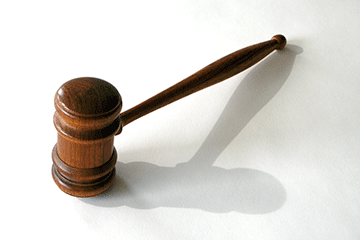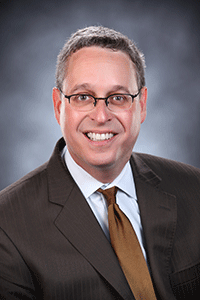
07/14/2015
Plenty of people at sports-minded SUNY Cortland participate in fantasy leagues, including Timothy Delaune.
But Delaune, an assistant professor of political science, doesn’t spend hours on the Internet researching player stats and cheering for pitchers on teams he doesn’t even like.
Instead, he reviews the judicial box scores of the nine justices of the United States Supreme Court and predicts how each will rule on upcoming cases, individually and as a majority.
And Delaune, a constitutional law specialist, is really good at it.
From last October through late June, SUNY Cortland’s pre-law advisor and moot court coach pitted his legal wits against those of nearly 4,000 online competitors in a game called FantasySCOTUS (Supreme Court of the United States).
When it was over, Delaune ranked near the top at number 18.
“What I find fascinating is it’s part science and it’s part art,” Delaune said. “You have to use the science but then you have to sit with the facts and consider what they mean. It’s a little like reading tea leaves.”
In FantasySCOTUS, players predict in advance how SCOTUS, an old telegraph acronym now commonly used as a shorthand reference by political insiders, will decide lower court rulings, and whether each appeals court case would be affirmed or overturned.
Delaune was about 74 percent correct in guessing the direction of individual justices, and was most accurate at predicting the votes of Chief Justice John Roberts and Associate Justice Elena Kagan. He correctly predicted the court’s decision in 54 of 73 cases.
 |
|
| Timothy Delaune |
According to Delaune, people’s fascination with the highest federal court of the United States turns on one remarkable fact:
“The Supreme Court is perhaps the most effective government institution we have at keeping secrets,” said Delaune, a graduate of Georgetown University who has a law degree from University of Chicago, a master’s degree from Tufts University and a doctorate from University of Massachusetts at Amherst. “There are a shockingly small number of leaks, historically. They really want to refine their opinion and have everything written and then discuss it before they release it to the public.”
Anyone can play FantasySCOTUS, but to rank in the competition a player must log his or her guesses on each and every Supreme Court ruling before it actually is made, Delaune said. That’s about 75 cases, most of them rather obscure.
The 2014-15 Supreme Court Term FantasySCOTUS competition was run by LexPredict and sponsored by Thomson Reuters.
“FantasySCOTUS is an attempt by some political science researchers to refine a computer program to predict the outcome of Supreme Court cases,” Delaune said.
LexPredict uses algorithms to predict the august, black-robed body’s actions. Since 2009, the company has offered attorneys, law students and other followers of the Supreme Court the opportunity to predict the overall outcomes as well as the votes of each justice in cases pending before the court.
Participants can earn cash prizes up to $10,000 for correctly predicting Supreme Court outcomes based on their observations and understanding of the cases, views of the justices and substantive federal and constitutional law.
The 2014-05 FantasySCOTUS attracted 3,852 players. Delaune’s reward will be a $100 gift certificate to Amazon.com. He also has the chance to share a short biography and comments about his prediction techniques on the FantasySCOTUS website.
“At my level, that’s the prize,” Delaune said. “But as you can tell from the pride I take in it, it’s about bragging rights. I’m a pretty darn good predictor of Supreme Court cases and outcomes.”
His students stand to benefit.
“It’s a way for me to make sure I’m paying completely close attention to all the cases the Supreme Court is considering,” said Delaune.
But in the past year, only 10 or 11 of the decisions were ones he might discuss in a classroom.
“If it’s a very important case to what I teach, then I will listen to the Supreme Court’s entire oral argument,” Delaune said. “Each week in a given session, there will be three days of oral arguments, with a released oral and written transcript from those cases. I was doing that anyway for my constitutional law students.
“But if it’s some obscure patent case, I might just read the reporting about that case. There are some good news outlets: the SCOTUS blog operated by Bloomberg News, for example. That has a number of good attorneys who will watch the oral arguments and report back. I can read a summary of just about anything.”
Here's where the tea leaves come in. To analyze the more controversial cases swirling through the court dockets, Delaune’s predictions often were based on tracking the caseload of individual justices. Starting in October, assignments to write the majority opinion are evenly distributed during each approximately month-long session and rulings are announced about two months later. So if a particular justice hadn’t written a majority opinion lately, that offered a clue about what remaining opinions would be released, who would write them and whether the more conservative or liberal end of the bench would be happy with the decision.
Of course for dry and complex cases, the personal bent of the justice writing the majority opinion offers few clues as to which way the court will come down.
And a crystal ball would be needed to predict one of the justices switching sides after the majority opinion is written, as apparently happened in the 2013 Affordable Care Act decision. Delaune hazarded a guess, later confirmed, that Chief Justice John Roberts, a politically conservative-leaning jurist, voted contrary to his prior record of decisions after finding constitutional support for the Act in written or spoken arguments made by the seeming minority.
Delaune advises not to be misled by what appears to be an unstoppable conservative or liberal groundswell. For example, the court’s consideration of the same sex marriage and Affordable Health Care Act cases seemed to represent a liberal head of steam.
“One shouldn’t forget that while it takes five justices to win a case, it only takes four justices to hear a case,” he said. “A minority can choose to hear a case. The theory is that this time some of the more conservative judges chose to take a case, but then it was decided in a more liberal direction. They might have voted to take a case thinking they would have a victory only to be defeated.”
Delaune assumes LexPredict is gathering tips from the most successful competitors to figure out ways to improve the performance of its own algorithm, which has predicted U.S. Supreme Court cases with 64 percent and 65 percent accuracy regarding cases and individual justices respectively.
By comparison, the FantasySCOTUS tinkerers have correctly guessed the case and individual justice decisions at 72 percent and 74 percent, respectively, he noted.
“They will try to find out what their program is missing so they can find a better predictor of case outcomes,” he said.
As is clear from the competition sponsors, the business community often has a keen interest in case outcomes, whether they are the recent headline grabber rulings like the Affordable Care Act or same sex marriage or some obscure ruling on patent or tax law case.
“That information is of use to savvy investors,” Delaune said. “It wouldn’t at all surprise me if some of investment firms were taking a look at (FantasySCOTUS). Still, it’s a bit of a crapshoot. Getting closer to 75 percent is statistically closer than a fifty-fifty coin toss. But it’s not enough to invest on reliably.”
The Affordable Care Act case in particular magnetized Wall Street.
“In fact, the week before it came out, there was some stock market activity indicating that there were investors who were concerned about the case,” he said.
This was Delaune’s first year participating in FantasySCOTUS. He hopes to edge his score upward in next year’s competition.
“Normally, because it’s the area that I teach, I wind up learning things I would otherwise miss and can bring into the classroom,” he said.
“I’m not only refining how I understand the law but maybe next year I’ll do even better predicting outcomes.”